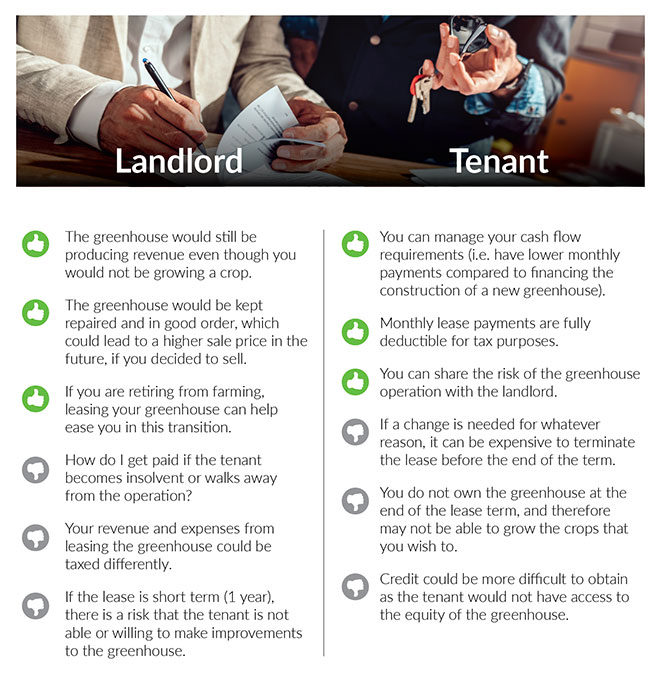
Features
Business
Management
The fineprint on greenhouse leases
Points you should consider as a potential landlord or tenant.
January 21, 2020 By Erich Weber
 The pros and cons of entering a greenhouse lease.
The pros and cons of entering a greenhouse lease. Farm business and greenhouse owners are presented with all sorts of opportunities. You might be looking at expanding your operation and need another greenhouse, or, you may be thinking of slowing down and reducing production. Either way, it is always a good idea to weigh the options available to you. In this article, we are going to focus on leasing greenhouses, and what greenhouse owners (landlord) and farmers (tenant) need to consider before signing on the dotted line.
The Good, The Bad, and The Ugly of Leases
Leases can be beneficial to both the landlords and tenants. At the top, you will see the pros and cons of entering a lease, both from a landlord’s standpoint and a tenant’s standpoint.
As you can tell, there are both advantages and disadvantages to entering a lease. Before entering into a lease, you need to weigh the pros and cons to see if it makes sense to do so. If you do decide to participate in a greenhouse lease, either as a landlord or tenant, then you need to find someone to work with.
In order to have a successful lease, the landlord and the tenant will need to be able to work together. Asking for references can help ensure that both the landlord and the tenant are being truthful and fully transparent with each other. Honesty is very important for the lease to be successful.
If it is believed that the lease can be successful for both parties, then it is time to start creating a written lease document. This will help both parties understand what each person is responsible for, and if there are any disagreements, how to solve them.
Written Lease Agreements
A written lease agreement can be as simple or as complicated as the landlord and tenant want it to be. A well-written and thorough lease agreement will, in the long run, be more beneficial to both parties. All written lease agreements should include the name and contact information for both the landlord and the tenant, as well as the legal description of the property that the greenhouse is being rented on. The following are some considerations for a written lease agreement, in addition to the basic
information.
- Insurance: What insurance should be carried by the landlord and the tenant? Is there a minimum that should be established in case of crop or greenhouse damage?
- Maintenance and repairs: Who is responsible for maintenance or repairs? Would the landlord be responsible in making sure that the greenhouse is fully repaired at the beginning of the lease, making the tenant responsible for maintenance thereafter?
- Crops to be grown: Are there any restrictions to crops that can be grown within the greenhouse (e.g. cannabis)? Are there any restrictions on how the tenant grows these crops?
- Municipal zoning restrictions: Are there any zoning restrictions that would prohibit the tenant from growing the crops they intended to? Is it the responsibility of the landlord to guarantee that the municipal regulations would be met, or should it be the tenant’s?
- Health and safety: Who would be responsible for ensuring that all proper health and safety regulations are met? Is the tenant responsible for providing and maintaining any protective gear used throughout the greenhouse?
- Resolution of differences: If there is a disagreement between the landlord and the tenant, how does it become resolved? What happens if the staff of the greenhouse are not adhering to the production practices outlined by the tenant? Who becomes the mediator/third party if the differences cannot be resolved between the landlord and the tenant?
- Rights to assign or sublet the lease: Can the tenant sublet the lease to someone else? What is the procedure? How much notice must be given to the landlord before the change?
- Right to access the greenhouse: How much notice must be given to the tenant before the landlord enters the greenhouse? Is there specific clothing/protective gear that must be worn before entering the greenhouse?
- Lease end date/extension: On what date does the lease end? Is there a lease extension, and if so, for how long? If the lease were to be extended, are there any changes that would need to be made to the lease (e.g. lease price)? What would constitute as grounds for the lease to end before the specified end date (e.g. lease clauses broken by either the landlord or the tenant, illegal activities conducted on the property, etc.)?
- Utilities: Is there a separate utility meter at the greenhouse? Does the tenant get billed directly for utilities from the company? Does the landlord reimburse the tenant for any personal use of the utilities?
These are just some of the considerations that the landlord and tenant should consider when drafting the lease agreement. In most cases, there are no specific rules in the terms of the lease. It is the responsibility of both the landlord and tenant to have these conversations and come to an agreement. If you are concerned about any aspects of the lease agreement, it is always a good idea to speak with your lawyer, and make sure that everything in the agreement is appropriate. If you would like more information on the components of a lease agreement, please see OMAFRA’s Factsheet on “Lease Agreements, Farm Buildings,” which can be found at http://www.omafra.gov.on.ca/english/busdev/facts/13-055.htm
Erich Weber is the business financial specialist with the Ontario Ministry of Agriculture, Food and Rural Affairs. He can be reached at erich.weber@ontario.ca
Print this page